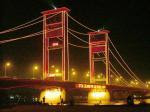Historically, Indonesian agriculture has performed well, and contributed significantly to Indonesia’s growth, bringing with it significant increases in employment and a remarkable reduction of poverty. This it did by focusing on the staple food crops such as rice, corn, sugar and
soybeans. However, with productivity gains of most food crops slowing down significantly, and with the majority of farmers operating less than one-half hectare, such crops provide less provide less potential for generating additional employment and income growth.
Jones said : The challenge for the new government will be to reinvigorate productivity gains among rural producers, and provide the foundation for long run sustainability of these productivity gains. In pursuing this challenge, the following would be important:
soybeans. However, with productivity gains of most food crops slowing down significantly, and with the majority of farmers operating less than one-half hectare, such crops provide less provide less potential for generating additional employment and income growth.
Jones said : The challenge for the new government will be to reinvigorate productivity gains among rural producers, and provide the foundation for long run sustainability of these productivity gains. In pursuing this challenge, the following would be important:
- Focus on farmer incomes; a rice focus no longer assures either incomes or food security.
- Productivity gains are key to farmer income growth, and for this rebuilding the research and extension systems will be critical.
- Funds will be needed for this, and could come from the unsustainable attempt to meet farmer credit needs through APBN (Anggaran Pendapatan dan Belanja Negara).
- Irrigated agriculture is clearly important, and should be seen as a cross-sectoral activity – the government needs to ensure the integrity of the infrastructure by more intensive involvement of water users, and improve the efficiency of water use to achieve more crop per drop.



Tidak ada komentar:
Posting Komentar